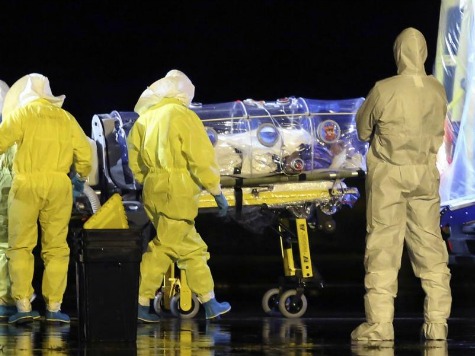
On Wednesday, a national nurses union called on President Barack Obama to use executive actions to mandate Ebola protocols for hospitals after two nurses at a Texas hospital that treated Thomas Eric Duncan came down with Ebola.
In an October 15 letter, National Nurses United Executive Director RoseAnn DeMoro asked Obama to “invoke his executive authority to mandate uniform, national standards and protocols that all hospitals must follow to safely protect patients, all healthcare workers, and the public.”
“The Ebola pandemic and the exposure of health care workers to the virus represent a clear and present danger to public health. We know that without these mandates to health care facilities we are putting registered nurses, physicians and other healthcare workers at extreme risk,” the letter states. “They are our first line of defense. We would not send soldiers to the battlefield without armor and weapons. In conclusion, not one more patient, nurse, or healthcare worker should be put at risk due to a lack of health care facility preparedness.”
The letter notes that hospitals should be directed to have “optimal personal protective equipment for Ebola that meets the highest standards used by the University of Nebraska Medical Centers,” full-body hazmat suits “that leave no skin exposed or unprotected,” and “at least two direct care registered nurses caring for each Ebola patient with additional RNs assigned as needed based on the direct care RN’s professional judgmnet with no additional patient care assignments.” They also called for more “continuous” and “interactive” training.
Union co-president Deborah Burger said what they heard from the nurses at the Texas hospital that treated Thomas Eric Duncan was “outrageous, heartbreaking and totally preventable.” She said nurses informed her that Duncan’s lab specimens were “sent through the tube system” instead of being hand-delivered to the lab, potentially contaminating the entire tube system. Nurses were given generic gowns and were initially told that masks and face shields were not mandatory. She said their necks were exposed, and nurses taped their necks with medical tape, which was not even impermeable and had permeable seams. There were no protocols and nurses were not told of the proper way “to don and doff the personal protective equipment,” she added. Guidelines also changed several times while Duncan was being treated and there was “no policy or regulation regarding cleaning and bleaching the surfaces.” In addition, nobody initially picked up the hazardous waste, Burger said.
“This nurse was being blamed for not following protocols that did not exist,” she previously said. “The nurses in that hospital were very angry, and they decided to contact us.”
According to a National Nurses United survey of 2,300 nurses at more 780 facilities in 46 states and the District of Columbia,” 85 percent of nurses “say their hospital has not provided education on Ebola with the ability for the nurses to interact and ask questions.” In addition, “40 percent say their hospital has insufficient current supplies of eye protection (face shields or side shields with goggles) for daily use on their unit” and “38 percent say there are insufficient supplies of fluid resistant/impermeable gowns in their hospital.” Another 41 percent “say their hospital does not have plans to equip isolation rooms with plastic covered mattresses and pillows and discard all linens after use” while “only 8 percent said they were aware their hospital does have such a plan in place.”

COMMENTS
Please let us know if you're having issues with commenting.